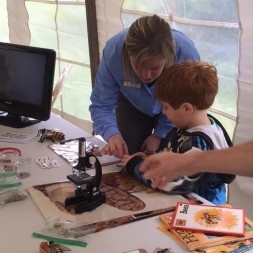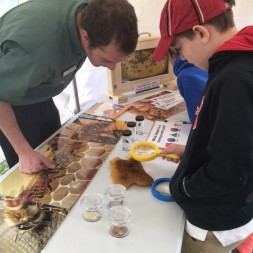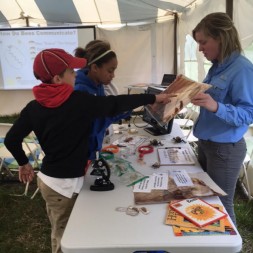May 25, 2016 // Local
Local woman heeds pope’s call for ecological education

Megan Ryan explains the anatomy of a honeybee to a student during an educational event May 15 at the Southwest Conservation Club. Parents are encouraged to sign up for summer classes now.
By Lauren Caggiano
A Bishop Luers educator is raising awareness about the benefits and importance of honeybees and honey through educational programming.
Megan Ryan, a special-education teacher and environmentalist, has married the two interests with the formation of the Southwest Honey Co. in Waynedale. In short, at the heart of this organization is conservation, beekeeping, education and fundraising.
Ryan and business partner Alex Cornwell have been acquainted for some time. Both grew up in and around nature at the 31-acre Southwest Conservation Club off of Bluffton Road—the future home of their endeavor. When the opportunity presented itself to transform their mutual passion into a business, the details seemed to “fall into place,” as she put it.
Southwest Honey Co. is the fruits of many months of labor. The end product is affordable, “adventure-style” educational programming for children K-12, and adult social events—all of which will further the organization’s mission of supporting the honeybee population. Youth programs are scheduled for Tuesdays and Wednesdays in June and July at the Southwest Conservation Club. Adult workshop dates will be announced soon.

A student examines a honey comb under a microscope during an educational event May 15 at the Southwest Conservation Club. Experiential learning is the hallmark of the organization’s programming.
Parents can expect hands-on activities that pique their children’s interest and encourage experiential learning and exploration. In her words, they are “little adventurers,” whose natural curiosity can be satiated by the programming.
“We really want students to walk away excited about pollinators,” said Ryan. “(We want them to realize) you don’t have to be a beekeeper to help the bees.”
Speaking of help, it comes full circle in a way. Ryan has several hives on site that provide honey to be sold as a fundraiser in support of the apiaries and the Southwest Conservation Club. Ryan touts the medicinal benefits of honey, noting that they use all-natural practices.
Though Ryan is doing her part to save the bees, there’s a larger and disturbing trend that has many scientists worried. On a global level the bee population is declining due to diseases and invasive pests. If left unaddressed, experts believe it will drastically change the world as we know it because of all of the hard work the honeybee does.
And that work translates into serious economic returns. The value of honey bee pollination to U.S. agriculture is more than $14 billion annually, according to a Cornell University study. Crops from nuts to vegetables and as diverse as alfalfa, apple, cantaloupe, cranberry, pumpkin, and sunflower all require pollinating by honeybees.
Ryan sees this stark reality as a wake-up call from God to change our ways. She cites the Adam and Eve story, when God gave humans dominion over all plants and animals. In order to be truly pro-life, “you have to care about all of it,” she said. That means respecting and caring for all forms of life—not just human beings.

Students learn to identify the anatomy of a honeybee during an educational event May 15 at the Southwest Conservation Club. Co-founder Megan Ryan started the organization to better connect students with their natural environment.
Pope Francis recently addressed this very topic, in the encyclical “On Care for Our Common Home” (Laudato Si’). In the document, he calls for an inclusive dialogue about how we are shaping the future of our planet. He challenges families to embrace a culture of ecology: “Ecological education can take place in a variety of settings: at school, in families, in the media, in catechesis and elsewhere. Good education plants seeds when we are young, and these continue to bear fruit throughout life.”
Ryan has accepted the pope’s challenge and hopes to continue making an impact — both in and outside the classroom. Ryan, who holds a master’s degree in education, was selected this spring for her outstanding work in Catholic education as 2016 winner of the Father Tom O’Connor Light of Christ Award. The award recognizes individuals for their commitment to social justice and peace. She was honored for work with Sodalitas, a service mission effort at Bishop Luers that engages almost 600 young people in work that helps to instill in them a desire to serve the community and each other as they move into adulthood.
That forward-thinking approach will serve her well as she advances the Southwest Honey Company’s mission. She was happy to report that the organization received a grant from the USDA’s North Central Region SARE (NCR-SARE) to study the “symbiotic relationship between farmers, ranchers and honeybees through consumer education.” The study will evaluate the direct impact and correlation between education through activity-based educational experiences and the choices consumers make to participate in active conservation of the natural environment in the community and at home.
In addition to private grants the Southwest Honey Co. depends on the support of the community. For each $5 donation, donors can name a bee. All funds go towards the mission of promoting and preserving the local honeybee population.
The best news. Delivered to your inbox.
Subscribe to our mailing list today.






